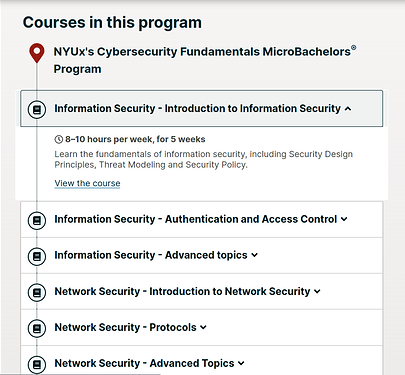NOTICE -
NYUx has retired the microbachelors program from Edx, and the courses are no longer available. The CyberSecurity Master Program by RITx is still active. Links will still be here for archival purposes.
There are other universities and companies with similar curriculum on Edx.
- IBM - IBM Cybersecurity Fundamentals Professional Certificate
- University of Washington - Professional Certificate programs | edX
- EC-Council - Cybersecurity Essentials Professional Certificate
- WGU - Online bachelor’s degrees | Earn your degree online with edX
General Recommendations
Don’t know where to get started? Follow this professional level course taught by New York University and the Rochester Institute of Technology. All courses are free to audit, and will teach you the fundamentals of cybersecurity theory, forensics, and networking.
After you understand the core concepts of cybersecurity, you can continue on your journey of offensive security and pentesting and explore what interests you most.
Be Patient
There is a lot of content in these programs. The programs and courses are designed to be done weekly. Set a schedule on what days to “attend class”. They also give a recommended number of hours per week you should work on them. While you can take multiple courses at once, if you cannot dedicated 20 hours a week for classes and homework consider only taking one at a time.
Be Involved
Take part in the discussion boards. Find or create a study group to learn together. Ask questions on the course boards or our help desk. The more involved you are with the “college lifestyle”, the more you will learn.
TLDR I Just Wanna Learn How to Hack Stuff
Here’s a list of practical, hands-on websites to practice and learn cybersecurity.
IT Fundementals Bachelor Program
If you are an absolute beginner, I recommend taking these courses for foundational knowledge before the cybersecurity courses. These courses are meant for beginners. If you are already proficient in one of the following courses, skip it.
Programming and Computing Basics
https://www.edx.org/course/basics-of-computing-and-programming
Introduction to Networking
https://www.edx.org/course/introduction-to-networking
Computer Hardware and Operating Systems
https://www.edx.org/course/computer-hardware-and-operating-systems
Cybersecurity Bachelors Program
5 week courses (8-10 hours per week) to teach the basics of information security, network security, and penetration testing.
Information Security - Introduction
https://www.edx.org/course/information-security-introduction-to-information-security
Information Security - Security, Authentication, and Access Control
https://www.edx.org/course/information-security-authentication-and-access-control
Information Security - Advanced Topics
https://www.edx.org/course/information-security-advanced-topics
Network Security - Introduction
https://www.edx.org/course/network-security-introduction-to-network-security
Network Security - Security Protocols
Network Security - Advanced Topics
https://www.edx.org/course/network-security-advanced-topics
Penetration Testing - Discovering Vulnerabilities
https://www.edx.org/course/penetration-testing-discovering-vulnerabilities
Penetration Testing - Exploitation
https://www.edx.org/course/penetration-testing-exploitation
Penetration Testing - Post Exploitation
https://www.edx.org/course/penetration-testing-post-exploitation
Cybersecurity Masters Program
8 week courses (8-10 hours per week) that expands upon what you’ve learned in the Micro Bachelors program.
Cybersecurity - Risk Management
Cybersecurity - Capstone
https://www.edx.org/course/cybersecurity-capstone

